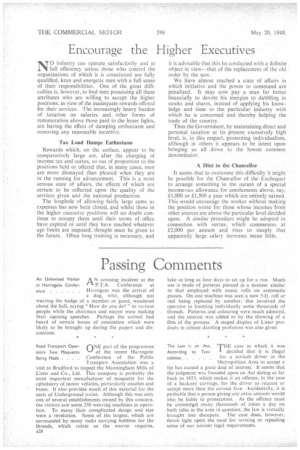Encourage the Higher Executives
Page 2

If you've noticed an error in this article please click here to report it so we can fix it.
NO industry can operate satisfactorily and at full efficiency unless those who control the organizations of which it is constituted are fully qualified, keen and energetic men with a full sense of their responsibilities. One of the great difficulties is, however, to find men possessing all these attributes who are willing to accept the higher positions, in view of the inadequate rewards offered for their services. The increasingly heavy burden of taxation on salaries and other forms of remuneration above those paid to the lesser lights, are having the effect of damping enthusiasm and removing any reasonable incentive.
Tax Load Damps Enthusiasm Rewards which, on the surface, appear to be comparatively large are, after the charging of income tax and surtax, so out of proportion to the positions held or offered that, in many cases, men are more dismayed than pleased when they are in the running for advancement. This is a most serious state of affairs, the effects of which are certain to be reflected upon the quality of the services given and the national production.
The loophole of allowing fairly large sums as expenses has now been closed, and whilst those in the higher executive positions will no doubt continue to occupy them until their terms of office have expired or until they have reached whatever age limits are imposed, thought-must be given to the future. Often long training is necessary, and it is advisable that this be conducted with a definite object in view—that of the replacement of the old order by the new.
We have almost reached a state of affairs in which initiative and the power to command are penalized. It may now payr a man far better financially to devote his energies to dabbling in stocks and shares, instead of applying his knowledge and time to the particular industry with which he is concerned and thereby helping the trade of the country.
Thus the Government, by maintaining direct and personal taxation at its present excessively high level, is, in this respect, promoting individualism. although in others it appears to be intent upon bringing us all down to the lowest common denominator.
A Hint to the Chancellor It seems that to overcome this difficulty it 'might be possible for the Chancellor of the Exchequer to arrange something in the nature of a special income-tax allowance for emoluments above, say, £1,000 or £1,500 a year which are entirely earned. This would encourage the worker without making the position worse for those whose incomes from other sources are above the particular level decided upon. A similar procedure might be adopted in connection with surtax, which commences at £2,000 per annum and rises so steeply that apparently large salary increases mean little.


























